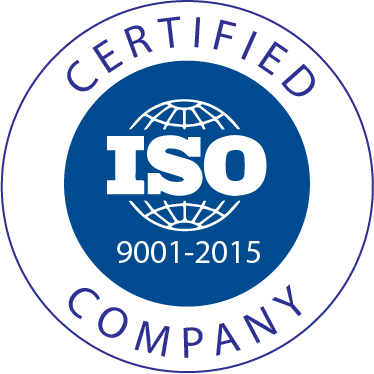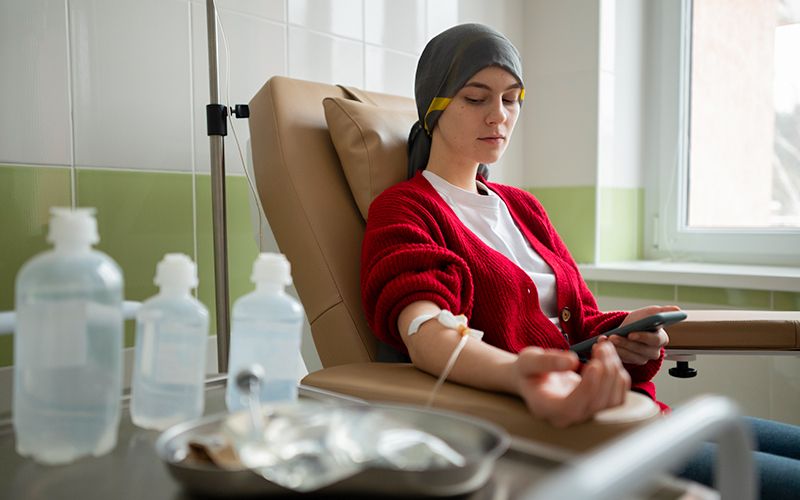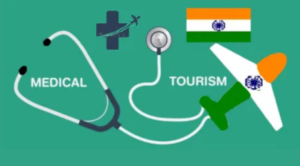India has positioned itself as a beacon for high-quality, cost-effective medical treatments in the evolving global healthcare landscape. This is particularly true for chemotherapy, a cornerstone in the battle against cancer. With increasing international patients gravitating towards India for medical care, understanding the nuances of chemotherapy costs in the country becomes essential. This blog aims to provide information about the various facets influencing chemotherapy cost in India, offering a valuable resource for those considering this vital treatment option.
What is Chemotherapy?
Chemotherapy, a cornerstone in oncological treatments, serves as a powerful arsenal against the relentless advance of cancer. By introducing potent pharmacological agents into the body, chemotherapy aims to decimate cancerous cells, targeting their inherent vulnerability—their rapid division and growth rate. This process is not indiscriminate, it is a calculated assault on cancer cells, designed to disrupt their cellular machinery, preventing their proliferation and survival. However, this intervention is not without its complexities. As chemotherapy agent(s) course through the body, they can also impact healthy cells, particularly those that share the characteristic of rapid division, such as cells in the digestive tract, hair follicles, and bone marrow. This collateral impact is the genesis of the varied and often challenging side effects associated with chemotherapy.
Tailoring the chemotherapy regimen is a science and an art, necessitating a deep understanding of the specific nature of the cancer and the overall health of the patient. To craft a personalized treatment plan, the oncologist must consider numerous factors, including the type of cancer, its stage and location, and the medical history of the patient. This plan outlines the specific drugs to be used, their dosages, their administration schedule, and the anticipated duration of the treatment. The objective is to harness the maximum therapeutic benefit—curtailing the spread of cancer and diminishing its impact—while meticulously managing the side effects to preserve the quality of life. In this nuanced and dynamic landscape, chemotherapy emerges not just as a treatment but as a strategic domain to overcome cancer, offering hope and a pathway to recovery for countless individuals.
Chemotherapy Cost in India
The cost of chemotherapy in India varies significantly depending on many factors. Key influences on the price include the type of cancer being treated, the specific chemotherapy drugs and protocols used, and the overall duration of the treatment. Additionally, the geographic location and the infrastructural quality of the chosen healthcare facility also play critical roles in determining the total expense. Despite these variables, chemotherapy treatments in India are generally much more affordable than the steep prices often seen in Western countries. This affordability is underpinned by lower operational costs and the availability of generic drugs, which are substantially cheaper than their branded counterparts. Moreover, the increasing proficiency and accreditation of Indian medical institutions have enhanced their credibility, making India a highly sought-after destination for cancer treatment among international patients. This cost-effectiveness not only benefits local patients but also attracts many foreign patients looking for quality treatment at more reasonable prices, thus maintaining the status of India as a global medical hub.
Factors Affecting Chemotherapy Cost in India
Diving deeper into the cost dynamics, several vital factors emerge as pivotal in shaping the overall expense of chemotherapy in India:
| Type of Cancer | The cancer variety plays a critical role, with different kinds necessitating distinct chemotherapy regimens, each with its cost implications. |
| Stage of Cancer | The progression stage of cancer can influence the treatment intensity and duration, impacting the cost. |
| Treatment Plan | The chemotherapy regimen, including the number of cycles and the drug combinations, is tailored to the specific needs of the patient, affecting the cost structure. |
| Location of Treatment | Geographical disparities exist within India, with costs fluctuating across different cities and regions, reflecting the local healthcare infrastructure and living costs. |
| Type of Hospitals | The choice of the hospital—be it a public institution, a private healthcare center, or a specialized cancer facility—can significantly influence the treatment cost. |
| Chemotherapy Method | The mode of chemotherapy administration (oral, intravenous, etc.) also plays a role in determining the overall treatment cost. |
How Does Chemotherapy Treatment Work?
Chemotherapy functions as a systemic treatment, distinguishing itself by its ability to target cancer cells irrespective of their location within the body. This wide-reaching approach is pivotal in tackling cancer cells that have metastasized or possess the potential to spread, providing a comprehensive strategy against the disease. The fundamental principle of chemotherapy lies in its ability to interfere with the cellular mechanisms essential for the survival and proliferation of cancer cells. By disrupting these processes, chemotherapy seeks to eliminate these malignant entities or significantly hinder their ability to grow and multiply.
The objectives of chemotherapy are multifaceted and are determined by various factors, including the type and stage of cancer, overall health and specific treatment aspirations of the patient. In some cases, the primary goal is the complete eradication of cancer, aiming for a curative outcome. In other scenarios, the intent may be more focused on delaying the progression of the disease, managing symptoms, or improving the quality of life for the patient. This adaptability in goals underscores the versatility of chemotherapy as a treatment modality, which can be tailored to meet the diverse needs and circumstances of each patient. By doing so, chemotherapy remains a cornerstone in the arsenal against cancer, offering hope and a pathway to better health outcomes for many afflicted by this challenging disease.
Types of Chemotherapy
| Type | Treatment |
| Oral Chemotherapy |
|
| Intravenous Chemotherapy |
|
| Injected Chemotherapy |
|
| Topical Chemotherapy |
|
| Intrathecal Chemotherapy |
|
Strategies to Regulate Chemotherapy
The field of chemotherapy is not static but continually evolving, embracing innovative strategies to enhance treatment precision and outcomes:
- Targeted Therapy: This advanced cancer treatment strategy specifically targets and attacks molecules and cellular pathways crucial for cancer cell growth and survival. This precision approach is designed to be less toxic than traditional treatments, focusing on cancer cells while sparing normal cells, thereby reducing side effects and improving patient quality of life. It signifies a shift towards personalized medicine, tailoring treatment to individual patient profiles for more effective outcomes.
- Dose-Dense Chemotherapy: Intensifies the treatment impact by administering chemotherapy at shorter intervals, maintaining dosage levels to prevent cancer cells from recovering between sessions.
- Combined Modality Chemotherapy: Combined modality chemotherapy integrates chemotherapy with additional treatment forms like surgery or radiation, enhancing cancer-fighting effectiveness. This approach aims to maximize the therapeutic impact by using chemotherapy to shrink tumors before surgery or enhance radiation’s effectiveness. It can also help eradicate microscopic disease remnants post-surgery.
- Cancer Immunotherapy: This represents a paradigm shift in cancer treatment, mobilizing the immune system of the body to identify and combat cancer cells, often in conjunction with chemotherapy.
These strategies exemplify modern chemotherapy’s dynamic and personalized nature, aiming to tailor treatment to the individual’s specific cancer characteristics and response.
Why Choose India for Chemotherapy?
Emergence of India as a premier destination for chemotherapy is rooted in its synthesis of advanced medical infrastructure and a patient-centric approach to healthcare. The nation boasts an impressive array of world-class hospitals equipped with state-of-the-art technology and adhere to international standards of medical care. These institutions are staffed by a cohort of oncologists and medical professionals who are adept in their fields and attuned to the nuances of patient care, ensuring that everyone’s journey is as comfortable as possible. Moreover, the treatment protocols in India are at the forefront of oncological research, offering patients access to the latest in chemotherapy techniques and drug regimens. This commitment to cutting-edge care is complemented by a holistic treatment ethos, where physical, emotional, and psychological well-being of patient is prioritized, creating a nurturing environment conducive to healing and recovery.
Furthermore, the cost-effectiveness of its medical services significantly enhances the appeal of undergoing chemotherapy in India. Compared to the excessive costs associated with such treatments in more developed countries, India presents a financially viable alternative without compromising the quality or comprehensiveness of care. The combination of cost-effectiveness and the availability of high-quality medical expertise makes India a compelling destination for global patients in search of premier cancer treatments. The healthcare system of the country is adept at integrating traditional hospitality with professional medical care, ensuring that patients and their families are supported throughout the treatment process. This unique blend of high-quality, affordable, and compassionate care makes India a favored destination for individuals battling cancer, looking for not just treatment but a beacon of hope and a path toward recovery.
Medical Tourism Companies
Medical tourism companies, such as UniMediks, are pivotal in transforming the country into a global healthcare destination, especially for chemotherapy. These organizations operate at the intersection of healthcare and hospitality, offering a conduit for international patients to access sophisticated cancer treatment facilities in India. They provide a comprehensive suite of services encompassing more than just medical coordination, they offer peace of mind. From the moment patients consider India for their treatment, these companies act as their trusted guide, assisting with everything from choosing the right hospital and specialist to arranging travel, accommodation, and language support. Their deep understanding of the Indian healthcare landscape and their partnerships with premier hospitals ensure patients are directed to institutions that best match their treatment needs and personal preferences.
Moreover, these medical tourism facilitators excel in personalizing the healthcare experience, understanding that the journey of each patient is unique. They meticulously coordinate the myriad details of the treatment process, including scheduling, financial planning, and aftercare, ensuring that the journey is as smooth and stress-free as possible. Beyond logistics, they provide emotional support, standing by the patient and their family throughout the treatment journey, embodying a holistic approach to care. This level of personalized and comprehensive service sets Indian medical tourism companies apart, making them an invaluable ally for international patients seeking chemotherapy in India. Through their efforts, patients receive cutting-edge medical treatment and experience the warmth, care, and hospitality India is renowned for, making their healing journey as comfortable and practical as possible.
Conclusion
Selecting a destination for chemotherapy is a decision of profound significance, with implications for treatment outcomes and overall well-being. India, with its harmonious blend of affordability, medical expertise, and comprehensive care, stands out as a prime choice for individuals battling cancer. Through medical tourism facilitators like UniMediks, patients gain access to a seamless healthcare experience characterized by personalized care and a commitment to excellence.
For those considering chemotherapy in India, UniMediks offers a gateway to an array of top-tier medical services, embodying the principles of compassion, innovation, and patient-centered care. Visit the official website at www.unimediks.com to discover how we can support your healthcare journey, ensuring access to world-class chemotherapy treatments at the forefront of medical innovation.
By choosing India for chemotherapy, patients can get top-notch medical care, underscored by a commitment to affordability and quality, hallmarks to the healthcare sector of the country.















